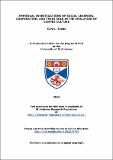Empirical investigations of social learning, cooperation, and their role in the evolution of complex culture
Abstract
There is something unique about human culture. Its complex technologies, customs,
institutions, symbolisms and norms, which are shared and maintained and improved
across countless generations, are what sets it apart from the ‘cultures’ of other
animals. The fundamental question that researchers are only just beginning to unravel
is: How do we account for the gap between their ‘cultures’ and ours? The answer lies
in a deeper understanding of culture’s complex constituent components: from the
micro-level psychological mechanisms that guide and facilitate accurate social
learning, to the macro-level cultural processes that unfold within large-scale
cooperative groups. This thesis attempts to contribute to two broad themes that are of
relevance to this question. The first theme involves the evolution of accurate and
high-fidelity cultural transmission. In Chapter 2, a meta-analysis conducted across
primate social learning studies finds support for the common assumption that
imitative and/or emulative learning mechanisms are required for the high-fidelity
transmission of complex instrumental cultural goals. Chapter 3, adopting an
experimental study with young children, then questions the claim that mechanisms of
high-fidelity copying have reached such heights in our own species that they will even
lead us to blindly copy irrelevant, and potentially costly, information. The second
theme involves investigations of the mutually reinforcing relationship predicted
between cultural complexity and ultra-cooperativeness in humans, employing a series
of laboratory-based experimental investigations with adults. Chapter 4 finds only
limited support for a positive relationship between cooperative behaviour and
behavioural imitation, which is believed to facilitate cultural group cohesion. Finally,
Chapter 5 presents evidence suggesting that access to cultural information is
positively associated with an individual’s cooperative reputation, and argues that this
dynamic might help to scaffold the evolution of increased cultural complexity and
cooperation in a learning environment where cultural information carries high value.
Type
Thesis, PhD Doctor of Philosophy
Collections
Items in the St Andrews Research Repository are protected by copyright, with all rights reserved, unless otherwise indicated.

